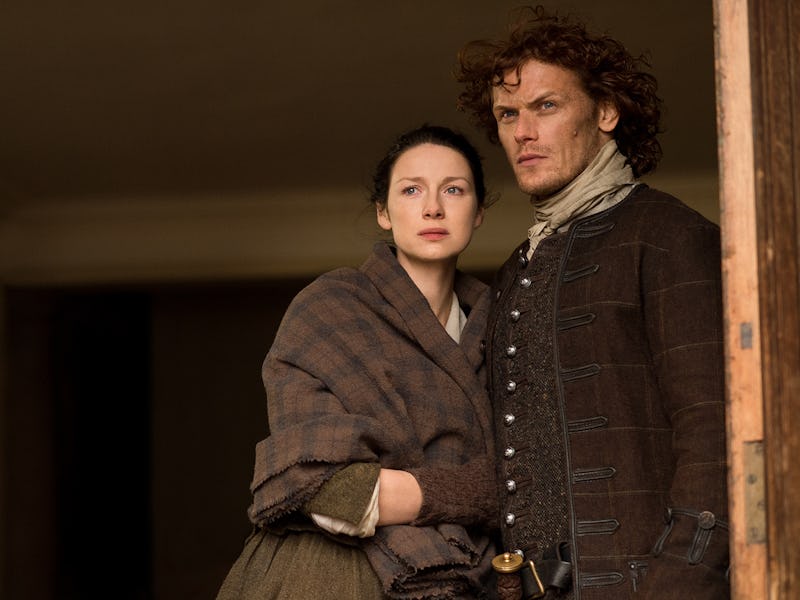Outlander Season 3 Will Shine a Light on a Divided Fandom
We investigate the Outlander fandom and its ideological divides as it heads into Season 3.

Recently, we argued that Outlander Season 3 will face a crossroads in its adaptation of the source novels by Diana Gabaldon. The novel in question, Voyager, came out in 1993 — when the cultural conversation about consent was different than it is today. In our analysis, we posited that one scene in particular might not land onscreen in 2017. That scene, by a classic definition, depicts a rape. The character Geneva says “no” pre-intercourse and Jamie, the hero of the story, proceeds to penetrate her anyway.
Gabaldon responded to our article, sharing a treatise on Twitlonger and her Facebook page on why her scene does not depict rape, citing the surrounding circumstances within the story. On the mentality that “no means no,” Gabaldon wrote: “It’s a useful fiction, developed in response to a very limited cultural context.”
Some fans first came to the Outlander story over twenty years ago; others discovered it recently, as the show began airing on Starz. Outlander stands alone in its focus on feminist issues. It explores female sexuality with depth, treats the domestic aspects of romantic relationships with a rare gravity, and prominently features the many grey areas that populate arguments about consent and sex.
Fans responded to Gabaldon’s Twitlonger essay with varying opinions on Outlander and the question of what defines a rape scene. Many of them spoke to Inverse as well.
“My feeling [about the Jamie and Geneva scene] is these two idiots had somehow managed to rape each other, which is an incredible act of narrative acrobatics,” said Lani Diane Rich, a 45-year-old fan. Rich owns a podcast network where she hosts an Outlander podcast called The Scot And The Sassenach.
“There is something really understandable in the response,” she added, about the social media stir following Gabaldon’s post. “I think there is an element of a generational feminism. The people who have loved Outlander have been loving Outlander for over twenty years. We didn’t always define rape as strictly as we are now. We didn’t believe all these things we now understand and believe to be true — which is that if someone says, “no, I don’t want to do this,” that there is withdrawal of consent. That that is rape. Some people still feel we shouldn’t be so strict about it. When you grow up participating in certain cultural ideals, it feels like, ‘well, I’ve lived my whole life like this…’”
A 25-year-old fan who regularly attends Outlander conventions, meet-ups, charity events, and the Tartan Day parade said, “I see it as a generational divide. There is such a wide divide in thought within this fandom. I don’t know about others in my generation, but [“no means no”] is something I feel very strongly about. To realize you’re surrounded by people who feel the opposite is jarring.”
That fan, who wished to remain anonymous, added that the dissent has made her feel uneasy about the fandom, but she will keep her eyes peeled for what this dialogue will look like once the scene appears onscreen.
“I’ll be curious to know if people also talk about this notion that the character Jamie is a good guy, and good guys don’t do bad things. I saw that a lot in the comments in relation to your article and Diana [Gabaldon’s] response. It’s going to be a wild ride when the season comes out.”
In conjunction with the 25-year-old fan’s idea of the “good guy” question, Bekah Decker, 33, said, “For me, as a viewer, I have in my mind the Jamie Fraser character as a certain way. Forceful sexual intercourse is not consistent with the man that I believe he is. If that happens in the TV show as a scene, I think there has to be a conversation.”
Along with Nikki Pierce, 34, Decker owns That’s Normal, a pop culture site that devotes between 25 and 50 percent of its coverage to Outlander in-season. Pierce and Decker had a different idea of what’s behind the ideological differences.
“I don’t want to be ageist; I don’t think [the different ideas of feminism] are across the board,” said Pierce. “But what might be generational is being able to disagree with a creator about something you really love but still be able to love it.”
Decker added, “Diana [Gabaldon] clearly doesn’t believe she wrote a rape scene — so obviously, I’m not going to tell her what she did or didn’t write. A lot of people are questioning it, and I think that’s okay. We need to have these conversations. Fandom is such a psychological study. It’s so fascinating. I love being a part of it and I love watching it.”
Rich underscored the importance of dialogue. “The people who make the show are going to deal with it however they feel is best,” she said. “The responsibility really falls on us as the viewing public to ask the necessary questions. When you have a rape like Jamie’s in Season 1, I think Outlander earned that because they dealt with the consequences. If a rape is used for a casual shock value, then we’re contributing to a culture that doesn’t take these things seriously, and that could be very damaging. The responsibility of the producers is not necessarily to do what the fans want — because different fans want different things. The responsibility is first and foremost to the story, and second, to not engaging with difficult material without earning it.”
“It’s not going to be a fun fandom or a real take on something if people don’t disagree,” said Pierce. “Variety is the spice of life — especially in fandom.”